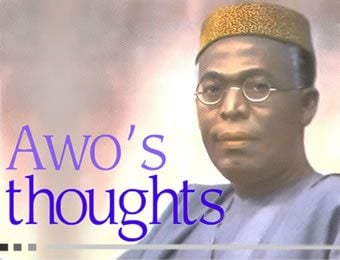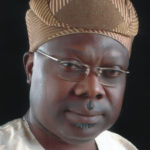May It Please Your Lordship, Though this is a point which will be taken up at a Higher Tribunal, yet I must say, with respect, that I disagree with your verdict as well as with the premises on which that verdict is based I have been in politics for upwards ono years. During this long period, I have operated in various theatres of the public life of this country.
I have, with others, fought British imperialism with all my might and with all the talents that it pleased God to give me; and we have succeeded. We have succeeded to the extent that Nigerians are today occupying positions which they never dreamt of fifteen years ago.
Again I have been, with others, in the vanguard in agitating for independence. I am the most unyielding advocate of a federal constitution for Nigeria. It is an irony of history that as one of the architects of Nigeria’s independence, “I have spent almost HALF of Nigeria’s THREE years of Independence, under one form of confinement or another.
Since 1957, I have fought with special and relentless vigour for the eradication of feudal oligarchy in the North, and in any case to prevent the spread of this evil political system to the Southern part of this country. During the same period I strongly advocated the breaking up of the North into more States in order to have true federalism in Nigeria, and to preclude the permanent subservience of the people of Nigeria to the aristocratic ruling caste in the North.
In short, I have always fought for what I believe, without relent and regardless of consequences to myself. In the result, I have rendered to Nigeria and to Africa services, which historians will regard as imperishable. Naturally, in the course of my long political activities, I have attracted to myself a sizeable crop of detractors and adversaries. Similarly, I have in my time known both setbacks and triumphs; and have met both with equal mind.
This is as it should be. Peter, NOT Peter the Apostle; but Peter, the hero of Hugh Walpole’s novel, FORTITUDE, said: ‘It isn’t life that matters; but the courage you bring to it.’ After life had done terrible things to Peter, he heard a voice that said among other things: ‘Blessed be these things; for of these things cometh the making of a man.’
In the words of Peter therefore, I declare: Blessed be your verdict which you have just pronounced on me. And in advance I also say: Blessed be such sentence as it may please your Lordship to impose upon me. I personally welcome any sentence you may impose upon me. As a Nigerian nationalist, my only concern is that my incarceration might do harm to Nigeria for three reasons.
First, the valuable services such as I have rendered before, and which I can still render would be lost to the country, at least for a season.
Second, there might be a heightening of the present tension, which has lasted for fifteen months and has done incalculable injury to the country’s economy.
Third, for a while, the present twilight of democracy, individual freedom and the rule of law, might change into one of utter darkness. But after darkness comes the glorious dawn. It is therefore, with a brave heart, with confident hope, and with faith in my unalterable destiny that I go from the twilight into the darkness, unshaken in my trust in the Providence of God that the glorious dawn will come on the morrow.
My enemies will say who am I to think that if I am imprisoned, the country might suffer. What, if I died?
The point is that I am still alive. Furthermore, the spirit of man knows no barrier never dies, and can be projected to any part of the world. This being so, I am confident that the ideals of social justice and individual liberty which I hold dear, will continue to be projected beyond the prison walls until they are realised in our lifetime. In this connection, I must stress that in this courtroom, particularly in this dock, and all over the Federation of Nigeria, the spirit of a new Nigeria is already active and at work. This spirit, working through all constitutional means, is sure to prevail before very long to the delight, freedom and prosperity of all and sundry. In spite of the delay of the past few weeks in delivering judgement, and in spite of my disagreement with your verdict, I must end by thanking your Lordship for your patience during the hearing of this case, and for the due consideration with which you have treated me and the other defendants.
Only a truly federal constitution can unite Nigeria
Speech made by Chief Obafemi Awolowo at the first press conference he held at Ikenne on 4th August, 1966, after his release from prison
The political crisis which started in Western Nigeria in May 1962 has acted on the entire Republic of Nigeria like a fairly big stone dropped in a big calm lake. It has produced a series of ever-widening circles of ripples. In the event, the violence and killings which commenced in the West had extended their infernal and poignant visitations to all parts of the Federation.
We have nothing to be ashamed of in all that has happened, as our detractors would wish. But we do need to have remorse in and demonstrate our shock at what had happened as well as express our profound grief and sympathy for the dead, the maimed and dispossessed, in all parts of Nigeria, and to whatever political camps they previously belonged. Those who may be tempted to rejoice at the awful fate that has befallen some of our countrymen, especially during the past nine months, should be reminded of this dreadful warning of Jesus Christ: ‘At that very time there were some people present who told him about the Galileans whose blood Pilate had mixed with their sacrifices. He answered them: “Do you imagine that, because these Galileans suffered this face, they must have been greater sinners than anyone else in Galilee?, I tell you they were not; but unless you repent, you will all ‘of you come to the same end, Or the eighteen people who were killed when he tower fell on them at Siloam – do you imagine they were more guilty than all the other people living in Jerusalem? I tell you they were not; but unless you repent, you will all of you come to the same end”.
Leaders should rule with fear of God
My conscientious appeal to all Nigerians is that instead of mocking the dead and fallen; instead of scheming vengeance against those who had wronged or harmed us, we should strive to see what lessons we can usefully learn from the historic, though calamitous and tragic, events of the past four years. As far as I am concerned, it is to the future – a future which we can make great and glorious by our united action, and invincible benevolence towards one another – that r have dedicated the rest of my life. Under no circumstances will be drawn into any sterile recriminations about the past which, in any case is gone, irretrievable and irremediable. During the past two years I have devoted-my full time in goal to an earnest search for solutions to Nigeria’s multitudinous and tantalising problems. One of my books, entitled ‘Thoughts On Nigerian Constitution’, which is devoted to ‘a consideration of our constitutional problems will be published by the Oxford University Press during the first week of October. In approaching our constitutional problems, I had taken pains to study and analyse the constitutional evolution of every country in the world. I make bold to say – and this will be substantiated by the contents of the book when published – that I did embark on my research with complete scientific objectivity. At the end of it, I was surprised – though pleasantly because of my precious stand in the matter – to be faced with the rationally and scientifically unassailable conclusion that only a truly federal constitution can unite Nigeria and generate harmony amongst its diverse racial and linguistic groups.
Unfortunately, it is not, recognised by the bulk of our people, including the intelligentsia and even some intellectuals, that the making of a constitution is applied political science, At this adolescent stage in the evolution of h01110 sapiens, it is no longer necessary for, political scientists or enlightened constitutional lawyers to grope in the dark in the search for a constitutional formula suitable for our country – or any country for that matter, or apply the rule of thumb to the making of a constitution,
My own study and analysis have led me, to the enunciation of certain laws or principles which must be observed in drawing up the constitution of any given country. I express the laws in the following terms:
- If a country is unilingual and uni-national, ‘the constitution must be unitary.
- If a country is unilingual or bilingual or multilingual, and also consists of communities which, over a period of years, have developed divergent nationalities, the constitution must be federal, and the constituent states must be organised on the dual basis of language and nationality.
- If a country is bilingual or multilingual, the constitution must be federal, and the constituent states must be organised on linguistic basis,
- Any experiment with a unitary constitution in a bilingual or multilingual or multinational country must fail, in the long run.
I readily concede that the former constitution had many defects. But federalism is certainly not one of them. It follows therefore, that a step in the right direction is first of a II to recognise the exact ailments of Our, nation. Once this is done, it should not be too difficult for, us to, devise appropriate remedies for them. But we must realise above all, things .else that in approaching our problems, at this juncture in our history, we must eschew any kind of partisanship- be it political or-ethnical, and, allow our thinking and reasoning to be guided by complete objectivity and rationality. Our hearts too must be ruled- by, unconquerable goodwill and irrepressible earnestness for Nigeria’s continued oneness. And on aspirations must be unflinchingly directed towards normative social objectives which are scientifically orientated.
In concrete terms, it is my firm belief that until we provide (1) employment., (2) free education from primary to university level, and (3) health I services, for all our citizens, the problem of unity will continue to plague us. And in this connection I hasten to predict that the breaking up of Nigeria into a number of sovereign states will not only do permanent damage to the reputation of contemporary Nigerian leaders, but will usher in terrible disasters which will bedevil us and many generations to come. Fortunately, with truly scientific and illuminated planning, all these social objectives can be ours in the immediate future. My appeal in this connection, therefore, is for unity and scientific planning.
To be continued






